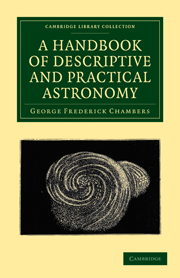Book contents
- Frontmatter
- PREFACE
- SUPPLEMENT
- Contents
- LIST OF ILLUSTRATIONS
- PRINCIPAL AUTHORITIES
- Errata
- A Handbook of Descriptive and Practical Astronomy
- BOOK I A SKETCH OF THE SOLAR SYSTEM
- BOOK II ECLIPSES AND THEIR ASSOCIATED PHENOMENA
- CHAPTER I GENERAL OUTLINES
- CHAPTER II ECLIPSES OF THE SUN
- CHAPTER III THE TOTAL ECLIPSE OF THE SUN OF JULY 28, 1851
- CHAPTER IV THE ANNULAR ECLIPSE OF THE SUN OF MARCH 14–15. 1858
- CHAPTER V THE TOTAL ECLIPSE OF THE SUN OF JULY 18, 1860
- CHAPTER VI HISTORICAL NOTICES
- CHAPTER VII ECLIPSES OF THE MOON
- CHAPTER VIII SUGGESTIONS FOR OBSERVING ANNULAR ECLIPSES OF THE SUN
- CHAPTER IX TRANSITS OF THE INFERIOR PLANETS
- BOOK III THE TIDES
- BOOK IV MISCELLANEOUS ASTRONOMICAL PHENOMENA
- BOOK V COMETS
- BOOK VI CHRONOLOGICAL ASTRONOMY
- CHAPTER I
- CHAPTER II
- CHAPTER III
- CHAPTER IV
- CHAPTER V
- BOOK VII THE STARRY HEAVENS
- BOOK VIII ASTRONOMICAL INSTRUMENTS
- BOOK IX A SKETCH OF THE HISTORY OF ASTRONOMY
- BOOK X METEORIC ASTRONOMY
- APPENDICES
- INDEX TO SUBJECTS
- INDEX TO NAMES
- Plate section
- Frontmatter
- PREFACE
- SUPPLEMENT
- Contents
- LIST OF ILLUSTRATIONS
- PRINCIPAL AUTHORITIES
- Errata
- A Handbook of Descriptive and Practical Astronomy
- BOOK I A SKETCH OF THE SOLAR SYSTEM
- BOOK II ECLIPSES AND THEIR ASSOCIATED PHENOMENA
- CHAPTER I GENERAL OUTLINES
- CHAPTER II ECLIPSES OF THE SUN
- CHAPTER III THE TOTAL ECLIPSE OF THE SUN OF JULY 28, 1851
- CHAPTER IV THE ANNULAR ECLIPSE OF THE SUN OF MARCH 14–15. 1858
- CHAPTER V THE TOTAL ECLIPSE OF THE SUN OF JULY 18, 1860
- CHAPTER VI HISTORICAL NOTICES
- CHAPTER VII ECLIPSES OF THE MOON
- CHAPTER VIII SUGGESTIONS FOR OBSERVING ANNULAR ECLIPSES OF THE SUN
- CHAPTER IX TRANSITS OF THE INFERIOR PLANETS
- BOOK III THE TIDES
- BOOK IV MISCELLANEOUS ASTRONOMICAL PHENOMENA
- BOOK V COMETS
- BOOK VI CHRONOLOGICAL ASTRONOMY
- CHAPTER I
- CHAPTER II
- CHAPTER III
- CHAPTER IV
- CHAPTER V
- BOOK VII THE STARRY HEAVENS
- BOOK VIII ASTRONOMICAL INSTRUMENTS
- BOOK IX A SKETCH OF THE HISTORY OF ASTRONOMY
- BOOK X METEORIC ASTRONOMY
- APPENDICES
- INDEX TO SUBJECTS
- INDEX TO NAMES
- Plate section
Summary
TheDominical Letter, called also the Sunday Letter, is an expedient by means of which we can readily find out the day of the week on which any day of the year falls, knowing the day of the week on which New Year's Day falls. To the first seven days of January are affixed the first seven letters of the alphabet—A, B, C, D, E, F, G; and the one of these which denotes Sunday is the Dominical letter. Thus, if Sunday is New Year's Day, then A is the Dominical letter; if Monday, that letter is G; and so on. If there were 364 days, or 52 weeks exactly in the year, then the Dominical letter would always be the same; but as the year contains aboixt 365¼ days, or 1¼ more than 364., this excess has to be taken into account every year, and the ¼ makes a day in every 4 years; so that the Dominical letter falls backward one letter every common year, and two letters every Bissextile or Leap year. Knowing the Dominical letter, we can ascertain all the Sundays, all the Mondays, &c, in the year. The reason why Leap years have two letters may be thus explained: —Take, for example, the year 1860.
- Type
- Chapter
- Information
- A Handbook of Descriptive and Practical Astronomy , pp. 255 - 260Publisher: Cambridge University PressPrint publication year: 2010First published in: 1861

